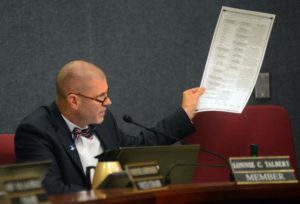
Sick-leave question will not go on general election ballot.
Bernalillo County commissioners rejected a request Thursday to add two questions to the Nov. 8 general election ballot – one centering on a proposal to require employers to offer paid sick leave to workers, the other on public financing of mayoral campaigns.
Both questions would have gone only to voters within Albuquerque city limits.
County Commission Chairman Art De La Cruz, a Democrat, said the county shouldn’t get involved in the legal debate over city ballot measures. The city has its own elections in odd-numbered years, and the county’s consideration of adding city questions is merely a “courtesy,” not a requirement, he said.
“I think it’s inappropriate for us to be placed in a position to decide a city matter,” De La Cruz told an audience of about 200 gathered for the special County Commission meeting.
Only one commissioner, Debbie O’Malley, supported the motion to add the sick-leave measure to the ballot. She moved that it be added, but no one offered to second the motion.
The vote was closer on the public-financing question. De La Cruz joined Republicans Wayne Johnson and Lonnie Talbert against adding the question, which would have asked voters to authorize an increase in the amount of funding that publicly financed mayoral candidates can receive.
In favor were Democrats O’Malley and Maggie Hart Stebbins, who cast her vote over the telephone.
The debate over whether the two questions make the ballot may not be over. Supporters and opponents of the sick-leave proposal, in particular, both hinted before Thursday’s meeting that they would be willing to go to court to contest the commission’s decision if they disagreed with it.
One point of intense legal debate is whether the whole seven-page ordinance, or just a summary, must go before voters. That’s critical because there’s not enough room on the ballot for the whole text.
If there is legal action, it could happen soon: The county clerk says she must submit the ballot to state officials by 5 p.m. Tuesday.
Johnson raised questions during Wednesday’s meeting about whether it was practical to add the two questions, given how small the type would have to be to make them fit on ballots.
De La Cruz repeatedly pointed out that no city attorneys were present to explain whether there’s a minimum font size for city ballot measures, among other questions.
O’Malley, meanwhile, said the debate over the sick-leave ordinance “has become something like a political football.” But the commission’s decision isn’t on the merits of the idea, she said, only on whether it will fit on the ballot.
And it’s clear a summary of the ordinance can fit, even if small type must be used, O’Malley said.
“I don’t have very good eyesight,” she said as she examined a draft ballot with city questions, but “I can read them.”
Proponents of the Paid Sick Leave ballot initiative hold signs the Bernalillo County Commission meeting about adding items to the ballot in the November General elections .Photographed on Thursday, September 8, 2016. Adolphe Pierre-Louis/JOURNAL
Sick-leave ordinance
The sick-leave proposal is the result of a petition drive by a coalition of left-leaning groups, including OLÉ New Mexico, the SouthWest Organizing Project, El Centro de Igualdad y Derechos and others.
It would require employers in Albuquerque to allow their workers to earn paid sick time off.
Supporters gathered enough signatures to trigger an election under a provision of the City Charter, so city councilors asked the County Commission to consider adding the proposal to this year’s general-election ballot. The next regular city election isn’t scheduled until October 2017.
Supporters of the sick-leave campaign said it isn’t fair to make voters wait a year to consider their proposal, especially after they timed the gathering of signatures to make it possible to go on this year’s ballot.
People on both sides packed into the meeting chambers Thursday afternoon.
Opponents said the proposal, which would apply to even part-time and temporary workers at any business with a physical presence in Albuquerque, regardless of size, is too onerous and might force some companies out of business. But if it must be presented to voters, they said, the whole ordinance should go on the ballot so people can read it themselves.
Among those fighting the measure are business and conservative groups, including the New Mexico Restaurant Association, Greater Albuquerque Chamber of Commerce, the Rio Grande Foundation, the New Mexico Association of Commerce and Industry and NAIOP, the commercial real estate development association.
Supporters said a summary has been used for similar ballot questions and that passage of the ordinance would ensure workers don’t have to choose between their paycheck and time off to care for themselves or a loved one.
Public financing
The proposed amendment to the City Charter would have provided somewhere in the neighborhood of $630,000 to each mayoral candidate who qualified in 2017, up from about $362,000 available in the 2013 campaign.
Each candidate would get $1.75 per registered voter in Albuquerque rather than $1, as called for now. Candidates who want to accept private donations could continue to raise and spend as much as they’re able.
Supporters say the change is necessary to make public financing a reasonable option for serious candidates. Privately financed candidates have sometimes raised amounts exceeding $900,000.
City councilors still have the option of calling a special election if they want to present the question to voters in December, but an election by mail would cost about $500,000 to $700,000.
Mayoral campaigns often start in January.
By: Dan McKay (Albuquerque Journal)
Click here to view source article.


